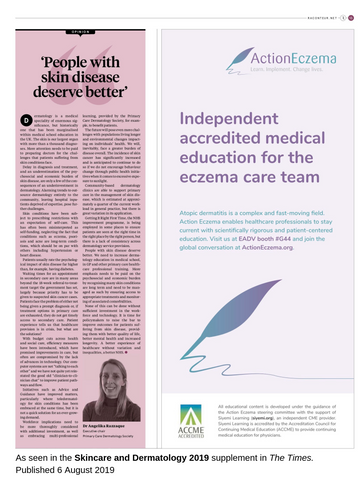
Eczema awareness and patient-centred education
Spotlight on atopic dermatitis
Atopic dermatitis (AD) has been in the spotlight lately, with the recent Skincare & Dermatology 2019 special report issued in The Times, as well as National Eczema Week (14–22 September 2019) from the National Eczema Society in the United Kingdom (UK), and World Atopic Eczema Day (14 September 2019) from the International Alliance of Dermatology Patient Organizations (IADPO), also known as GlobalSkin.
October marks the start of National Eczema Awareness Month in the United States (US), and the goal of this year’s campaign is to raise awareness, reduce stigma and illuminate the true effects of eczema.
In this week’s commentary, we reflect on why people with skin disease deserve better and consider how improved education and workforce training in dermatology could help patients manage the manifold effects of AD.

Is dermatology addressing the burden of atopic dermatitis?
While more recent research and awareness campaigns have been highlighting the negative effects of AD on mental health, there also must be a greater focus on preparing healthcare professionals for the challenges that patients suffering from skin conditions face. Dermatology is an important medical speciality but also one that has been marginalised within medical school education.
“Skin conditions have been subject to prescribing restrictions with an expectation of self-care. This has often been misinterpreted as self-funding, neglecting the fact that conditions such as eczema, psoriasis and acne are long-term conditions, which should be on par with others including hypertension or heart disease. Patients usually rate the psychological impact of skin disease far higher than, for example, having diabetes.
Dr Angelika Razzaque
Executive chair
Primary Care Dermatology Society
Delay in diagnosis and treatment, and an underestimation of the psychosocial and economic burden of skin disease, are only a few of the consequences of an underinvestment in dermatology. The psychosocial burden of AD was recently highlighted in the first analysis of quality of life in AD patients in Portugal.1 The cross-sectional study revealed the negative impact of the disease in this population, and concluded that more awareness-raising activities are needed to increase literacy, decrease the stigma and improve patients’ quality of life.1 Another study revealed the direct and indirect costs of moderate-to-severe AD in adult patients in Italy.2 The multicentre, observational study concluded that AD represents an important cost for society, imposing a high financial burden on the healthcare system, but even more so for patients and caregivers.2

In the UK, there is a lack of consistency across dermatology service provision, despite skin disease comprising around a quarter of the current workload in general practice. Similar findings are reported in the US, where a study on the real-world outpatient prescription patterns for AD concluded significant treatment variation exists among specialists managing AD, with increasing polypharmacy over time.3 Analysis of data from the 1993–2015 National Ambulatory Medical Care Survey, including 128,300 paediatric and 623,935 adult outpatient visits, showed the proportion of patients receiving multiple prescriptions was higher in visits to primary care practitioners versus dermatologists, those with private versus public insurance, and in patients 50 years or older versus 20 to 49 years versus 0 to 19 years.3
Dr Angelika Razzaque, executive chair of the Primary Care Dermatology Society (PCDS) in the UK, comments: “patients face the problem of either not being given a prompt diagnosis or, if treatment options in primary care are exhausted, they do not get timely access to secondary care. Patient experience tells us that healthcare provision is in crisis, but what are the solutions?”
Refining eczema patient care
Greater emphasis needs to be placed on the psychosocial and economic burden of AD by recognising that it is a chronic condition and needs to be managed as such by ensuring access to appropriate treatments, support and monitoring of associated comorbidities.
“People with skin disease deserve better. We need to increase dermatology education in medical school, in GP and other primary care healthcare professional training. None of this can be done without sufficient investment in the workforce and technology. It is time for policymakers to raise the bar to improve outcomes for patients suffering from skin disease, providing them with better quality of life, better mental health and increased longevity.”
Dr Angelika Razzaque
Executive chair
Primary Care Dermatology Society
To improve your knowledge of eczema and patient quality of life in AD, visit our online CME course ‘Disease burden and quality of life in atopic dermatitis’. To find out more about current research in AD, including global trends and new data on the management of eczema, explore our new Congress Report online CME courses:
Action Eczema will also be in Madrid, Spain next week for the European Academy of Dermatology and Venereology (EADV) 2019 Congress. Visit us at booth #G44 and learn more about our freely available patient-centred CME in AD.

About Action Eczema
Action Eczema is a global learning community designed to support all health professionals involved in the care of patients with AD. We provide a range of online CME courses to facilitate increased knowledge, competence, confidence, and performance related to eczema care.
Action Eczema recently appeared in the Skincare & Dermatology special report, which highlighted the importance of holistic care for people suffering with AD.
We support the PCDS’s call for better education and workforce training in dermatology.
References
- Carvalho D, Aguiar P, Mendes-Bastos P, Palma-Carlos A, Freitas J, Ferrinho P. Quality of Life and characterization of patients with atopic dermatitis in Portugal-QUADEP study. J Investig Allergol Clin Immunol. 2020;30(6).
- Sciattella P, Pellacani G, Pigatto PD, Patrizi A, Peris K, Calzavara-Pinton P, et al. The burden of atopic dermatitis in adults in Italy. Giornale italiano di dermatologia e venereologia: organo ufficiale, Societa italiana di dermatologia e sifilografia. 2019.
- Singh P, Silverberg J. Real-world outpatient prescription patterns for atopic dermatitis in the United States. Dermatitis. 2019;30(5):294-9.